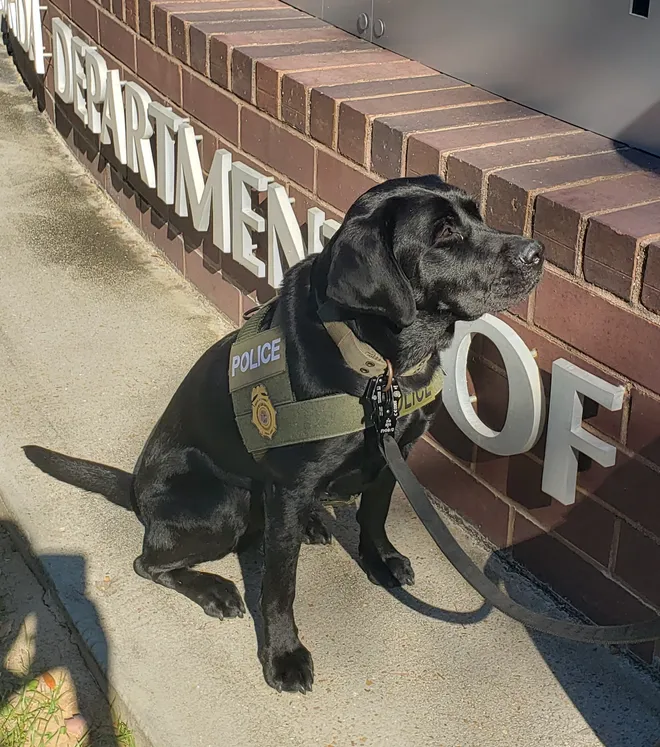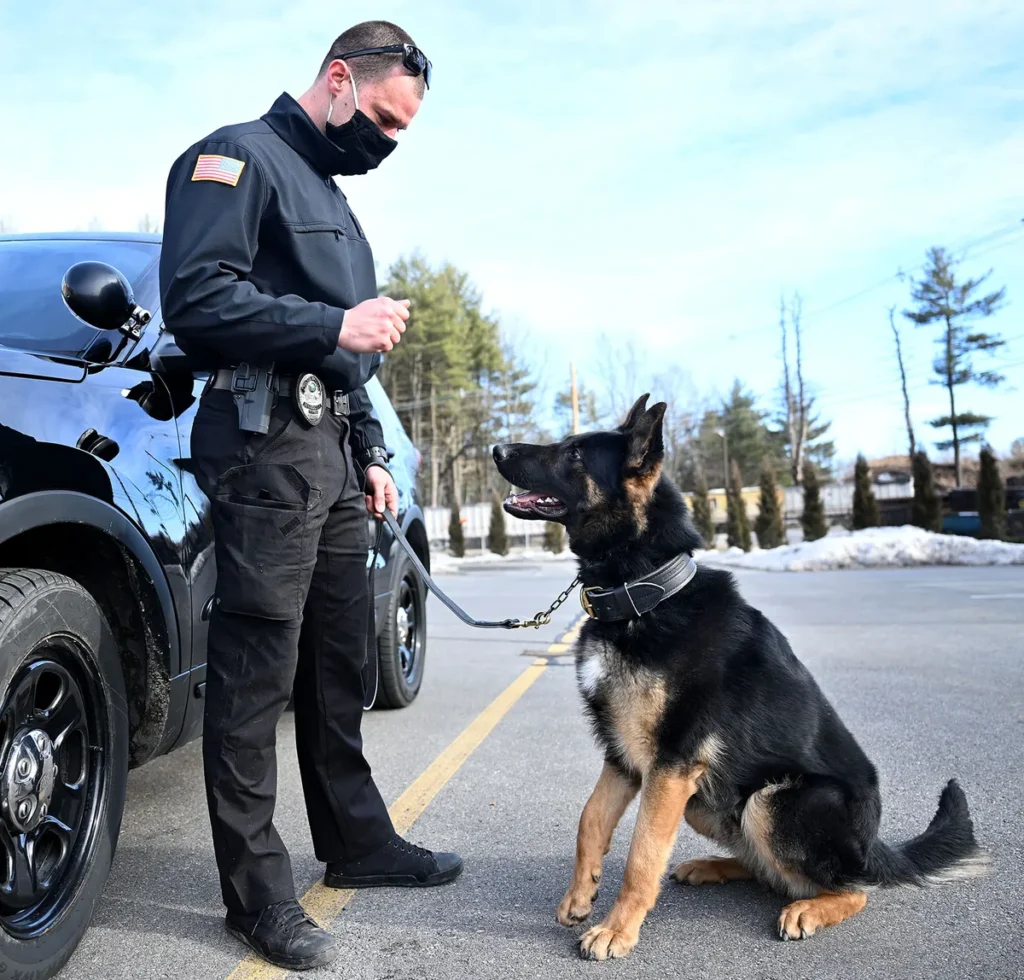
Introduction
Police dogs aren’t neutered predominantly because maintaining their complete hormonal balance can significantly enhance their work performance, aiding them execute tasks with increased energy, focus, and aggressiveness which are critical traits for their line of duty.
| Reasons | Explanation |
|---|---|
| Natural Aggression | Neutering can reduce the natural aggression of a dog which is essential for police work. |
| Physical Performance | Castration can impact the muscle buildup and physical performance, limiting their ability to perform tasks. |
| Hormone-related changes | Police dogs need high levels of testosterone for their roles. Neutering reduces this hormone causing drastic behavioral and physical changes. |
| Technological Development | Technologies like birth control implants now allow police forces to prevent unwanted breeding without neutering. |
The table above summarizes the primary reasons why police dogs aren’t usually neutered. On breaking down each point, we unearth the complexity behind this decision.
Natural Aggression
First, the ‘Natural Aggression’ line speaks to the fact that neutering can reduce a dog’s natural aggression. This reduction might be beneficial in a household environment where docility is preferred, but it’s not optimal for police dogs. The dogs working in law enforcement need to have a certain amount of aggression as part of their job involves chasing down suspects and sometimes engaging in potential physical confrontations.
Physical Performance
Next, we touch on ‘Physical Performance’. When a dog is castrated, there’s a potential dip in muscle mass and general robustness. This drop could affect their ability to carry out jobs that require strength and endurance, such as public order tasks or search and rescue missions.
Hormone-related changes
Thirdly, we have ‘Hormone-related changes’. Dogs, much like humans, are significantly influenced by their hormones. Testosterone is a dominant hormone in male dogs, playing a pivotal role in their metabolism, behavior, and physiology. When a dog is neutered, their testosterone levels can decrease which might lead to drastic behavioral and physical changes, not very conducive to their work in law enforcement.
Technological Development
Lastly, ‘Technological Development’ highlights recent innovations in veterinary science that have given birth to alternative methods for preventing unwanted pregnancies. Specifically, birth control implants have emerged as a viable solution for police departments looking to manage canine populations responsibly without resorting to surgical sterilization.
As American cartoonist and author Ben Greenman aptly quipped, “A dog teaches a boy fidelity, perseverance, and to turn around three times before lying down.” These attributes, even more important in police dogs, might be compromised with neutering hence such care in the decision-making process.
Understanding the Role of Canine Breeding in Police Work

The role of canine breeding in police work is a multifaceted one, comprising of aspects such as genetics, training, temperament and physical prowess. But when it comes to the question “Why aren’t police dogs neutered?” it intersects even deeper with how dog breeding contributes to their viability for police work.
Dog Breeding and Work Traits
Dog breeding has a direct impact on creating dogs which exhibit traits needed in police work. For instance, breeds like German Shepherds, Belgian Malinois and Labrador Retrievers are often preferred in police work since they showcase traits such as intelligence, agility, strength and an ability to be trained readily. These characteristics, entire byproduct of deliberate and controlled breeding, help them perform duties ranging from tracking, search operations to narcotics discovery and public safety.
Neutering and Its Impacts
Neutering can indeed affect these very traits that make certain dog breeds exceptional for police work. Here’s why:
- Hormonal Balance: Neutering involves removing the testes, which are integral producers of testosterone. This hormone plays important roles including maintaining muscle mass, bone density and assertive behaviors necessary for police work.
- Physical Prowess: Dogs that have been neutered typically have lower lean body mass (source). Since physical strength and endurance are vital qualities in police dogs, retaining their natural physique might have advantages.
- Mental Sharpness: Although there isn’t absolute scientific consensus, many claim that neutering can possibly affect cognitive abilities and attentiveness levels in dogs (source), thereby potentially affecting their performance in police duties.
A Case-by-Case Basis
Despite these general points, the decision to neuter or not is not necessarily universal. It may vary from case to case, depending on the individual dog’s health, demeanor, job requirement and the specific protocols followed by the respective law enforcement agency. Some police dogs do get neutered, typically after their active duty period or if required due to specific health conditions.
“The greatness of a nation and its moral progress can be judged by the way its animals are treated.” [Mahatma Gandhi] This quote rings true especially in this context as our understanding and respect for the physiology and nuances of our four-legged law enforcers could significantly contribute to their effectiveness in their noble duty of protecting us.
Impacts and Implications of Neutering on a Police Dog’s Performance

When we consider the question, “Why aren’t police dogs neutered?” we dive into the realm of understanding the impacts of neutering on a police dog’s performance. Neutering involves the removal of the testes in male dogs, thus curbing the production of testosterone. This hormonal change brings about physical and psychological changes which can potentially affect a police dog’s performance. Let me delve deeper:
Impact on Physical Performance
One of the main reasons why police dogs aren’t neutered is linked to the effects of neutering on physical capabilities. Testosterone plays a key role in muscle development and bone health1. Thus, the absence of this vital hormone may result in a weaker physique, less stamina, and a slower response time – all qualities that are detrimental in a police canine.
“A dog is the only thing on earth that loves you more than he loves himself.” – Josh Billings. As true as this quote is, un-neutered police dogs exhibit higher endurance, agility, strength aiding in their love to serve humans.
Behavior Changes
While neutered dogs are generally seen as more docile due to the reduction in testosterone leading to less aggressive behaviors2, this same effect may impact a police dog’s ability to be assertive during critical operations. The assertiveness, boldness, and bit of aggression can prove useful in policing roles. Therefore, neutering could detract from these beneficial behavioral traits, and thus, many police dogs remain unneutered.
Training and Role Adaptability
Given the inherent responsibilities of a police dog ranging from sniffing out explosives or narcotics to search and rescue operations, adaptability forms a crucial component of their performance3. An unaltered state can sustain the motivation levels required for rigorous training regimens and various operational roles.
Let’s look at a brief comparison between unneutered and neutered police dogs’ potential performance characteristics in the table below:
| Unneutered Police Dogs | Neutered Police Dogs | |
|---|---|---|
| Physical Performance | Potentially Higher | Possibly Reduced |
| Behavior Traits | Assertive, Bold | Possibly More Docile |
| Training and Role Adaptability | Highly Adaptable | Potential decrease in Motivation |
However, it’s critical to remember that these are generalizations and individual reactions to neutering can vary. Factors like breed, age at the time of neutering, genetics, and individual personality should also be taken into account when evaluating the potential impacts on a police dog’s performance.
To quote Roger Caras, “Dogs are not our whole life, but they make our lives whole.” Even with the possible implications, factors leading to an intact police force remain largely related to their performance on the job. Nevertheless, each canine cop is unique, altering decisions to neuter should be made looking at complex factors beyond just performance impacts.
Exploring Hormonal Influences on Aggression: The Case of Non-neutered Police Dogs

Interesting question, and I’m glad you asked. The topic of neutering police dogs is often brushed under the rug, but it’s indeed worth exploring, especially concerning its relationship with aggression and hormonal influences. Let’s unwrap this subject layer by layer.
Why Are Police Dogs Not Neutered?
The reason that many police dogs are not neutered can be rooted in multiple factors such as:
Hormonal Balances
Like other animals, dogs’ behavior are heavily influenced by hormones. When a male dog is neutered, there’s a drastic reduction in testosterone levels. This depletes them of some of their energy, which could make them less effective in intense police work scenarios like pursuing suspects or sniffing out narcotics. A paper published in “Journal of Animal Science” supports this argument stating that castration can modify responses to stress and overall behavior in dogs (source).
Maintaining Aggression Levels
While excessive aggressiveness in common domestic dogs may cause issues, controlled-aggressiveness in police dogs can be beneficial. It is usually considered necessary for detection, apprehension tasks where they need to demonstrate assertive behavior. Research has shown that neutering can impact the level of aggression in dogs (source: American Kennel Club Canine Health Foundation). By keeping the police dogs intact, their aggressive edge that aids in law enforcement tasks is maintained.
Breeding Prospects
Superior or highly skilled police dogs may be kept intact to breed future working dogs. Their desired traits—intelligence, alertness, speed, strength—can be genetically passed onto their offspring that might be favorable to police departments.
Hormonal Influences on Aggression: Non-Neutered Police Dogs
Testosterone, primarily released through the testes in males, is known to influence aggression in many animal species, including dogs. According to research conducted by The American Veterinary Society of Animal Behavior, increased levels of circulating testosterone in unneutered males can propel more assertive and bold behaviors, essential traits required in police dogs (source here).
It is a rather delicate balance – the right amount of aggression driven by hormones makes these dogs excellent and dependable companions for police officers, but unchecked aggression might lead to unwanted confrontational situations.
As John Steinbeck, an American author, once said, “I’ve seen a look in dogs’ eyes, a quickly vanishing look of amazed contempt, and I am convinced that basically dogs think humans are nuts.”.
In essence, not neutering police dogs is a decision made not just based on maintaining an appropriate aggression level, but it’s also tied up with considerations about their physical readiness, breeding prospects, and the rewarding intensity of their work.
Reasons Behind Police Dogs not Being Neutered
Fascinating as it is, there are significant reasons behind police dogs not being neutered. A primary reason revolves around the influence of hormones on the dog’s strength, vigor and aggression. These hormones, which would dwindle away post-neutering, perform vital functions in enhancing their natural capabilities, making them more effective in police work.
- On a physiological level, these hormones stimulate muscle and bone growth, important characteristics for a police dog that often needs to tackle criminals physically.
- Neutering could potentially tamper with their strength, reducing their physical prowess – an aspect they immensely rely on in high-stakes scenarios.
“Hormones play a crucial role in the makeup of a dog’s strength and behavior” – Cesare Milan (Dog Whisperer)
The hormonal balance can also impact a dog’s behavioral characteristics, another critical aspect for police dogs. They require high energy and aggression levels to stay persistent in tracking down threats, keeping them away from danger or rescuing people. Despite common misconceptions, an altered hormonal balance due to neutering might cause a decrease in these vital traits.
| Hormone | Function in Police Dogs |
|---|---|
| Testosterone | Influences aggression, muscle strength and stamina |
| Estrogen | Motivates nurturing instincts used in rescue operations by FEMA |
Most importantly, emotional aspects cannot go unconsidered. Dogs have feelings too, and abrupt biological changes like neutering can lead to stress and anxiety, resulting in reduced morale and productivity in missions.
- Police dogs often form bonds with their handlers and teams, relying on their affections and kinship for comfort.
- Possible mood swings or emotional turbulence caused by hormonal shifts could hamper this camaraderie, affecting teamwork and ultimately mission success.
References:
- American Kennel Club: The Effect of Hormones on Working Dogs
- North American Police Work Dog Association: Why aren’t police dogs neutered?
Remember that while law enforcement agencies aren’t completely against neutering, they primarily base their decision on what makes the most tactical and practical sense on the field. This approach allows our brave K-9 forces to serve alongside our officers effectively, ensuring peace and safety within our communities.
Related
- What Dog Would Beat A Wolf
- How Do You Bond With A Belgian Malinois
- Is A Belgian Malinois A Good First Dog